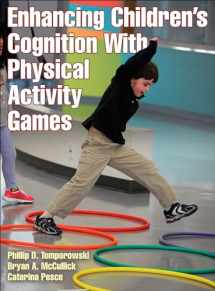
Enhancing Children's Cognition With Physical Activity Games
Book details
Summary
Description
There are plenty of books that help you use or create games that develop children’s physical skills, and it’s now widely accepted that physical activity can have a positive effect on academic achievement. But this is the first book that shows you how to tailor physical activity games specifically to enhance children’s cognitive abilities.
Enhancing Children’s Cognition with Physical Activity Games, written by three authorities in teacher education, exercise physiology, and sport science, shows you how to apply current concepts in child development, cognitive science, physical education, and teacher training to create movement-based learning experiences that benefit children both physically and mentally.
You will be guided in creating environments that lend themselves to cognitive development and enhanced academic achievement. And you will understand not only how to create games to foster cognitive development but why such games are so useful in developing the whole child.
Enhancing Children’s Cognition with Physical Activity Games offers the following features:
•Two chapters of sample games, one for preschoolers and kindergarteners, the other for elementary school children
•Expert guidance in creating your own games for children ages 3 to 12, with an emphasis on developmental ranges of 3 to 7 and 7 to 12
•A practice-oriented model of teacher education that shows you how you can best develop and implement physical activity games that support both motor and cognitive development
The book contains a running glossary to help teachers and students understand the terms used. It also discusses several models of 21st-century learning, highlighting the role that physical activity games play in a comprehensive education.
Enhancing Children’s Cognition With Physical Activity Games is equally useful for teachers working with children in school, before school, or after school and for program directors working with children in community programs. The authors link their application to research, creating a practical reference for professionals in the field, whatever their setting.
The book is presented in three parts. Part I grounds you in the research that shows how physical activity affects children’s mental development. You will learn how physical activity benefits children’s cognition and academics, how movement games help children think and learn, and how to create a motivational environment where children want to learn.
Part II helps you translate research into practice. You will explore how movements create mental maps and affect mental health, how to engage children in playful learning, and how to incorporate physical activity into your teaching and enhance your teaching models. You will also consider how to assess children at play—how to collect data and know when your program is being effective—and how to apply physical activity games in both the home and the community.
In part III, you are supplied with games for preschoolers, kindergartners, and elementary school children. You’ll find games that emphasize three principles: contextual interference, mental control, and discovery.
Each chapter concludes with practical implications for teeachers, helping you to put into context the information you have come across in that chapter.
Enhancing Children’s Cognition with Physical Activity Games helps educators create, design, implement, and evaluate problem-solving games that foster children’s mental engagement and thoughtful decision making. Kids are highly motivated by problem-solving games, and the cognitive skills they develop in solving those problems can be translated to their academic success.


We would LOVE it if you could help us and other readers by reviewing the book
Book review



